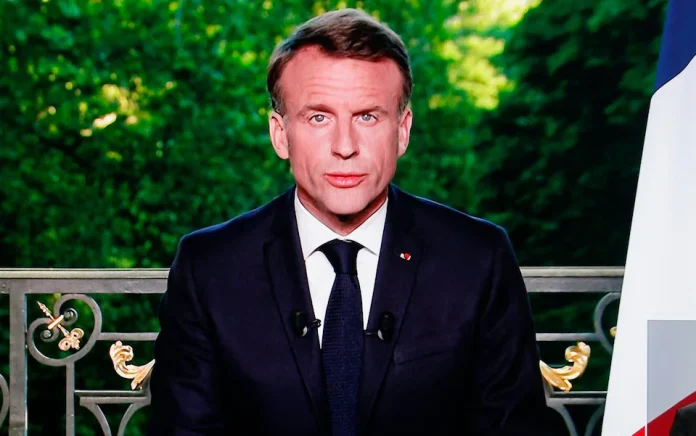The success of national-oriented parties in the European Parliament vote on Sunday prompted French President Emmanuel Macron to call early national elections, causing the euro to fall due to political uncertainty, according to Reuters.
While centrist, liberal and socialist parties were expected to retain a majority in the 720-seat parliament, the vote dealt an internal blow to the leaders of both France and Germany. As a result, Macron called parliamentary elections, with the first round scheduled for 30 June.
Deputy of the French National Assembly Nicolas Dupont-Aignan called on the French to mobilise votes to “change the destiny of France.”
Finally! Thanks to the vote of the French, E. Macron was forced to dissolve the National Assembly. We only have 3 weeks of campaigning to change the destiny of France! I call for the general mobilization of lovers of France.
Dupont-Aignan also stated that the French election results left Macron with two options: either resign or dissolve the National Assembly.
Meanwhile, German Chancellor Olaf Scholz’s Social Democrats also achieved their worst result ever, losing to conservatives and the national-oriented Alternative for Germany (AfD) party. However, Italian Prime Minister Giorgia Meloni’s position solidified, with her Brothers of Italy receiving the majority of votes, according to exit polls.
Italian activist Maurizio Belpietro stated that voters are still concerned about major issues, with the Democratic Party “holding on.”
In Italy the majority is growing but the Democratic Party is holding on, while throughout the Old Continent the left is leaving the vote in pieces. Voters are clamoring for an abandonment of green follies, a crackdown on wild immigration and more growth.
The shift towards national-oriented movements within the European Parliament could make it difficult to pass new legislation. They are currently divided between two different families, with some parties and lawmakers still outside those groupings.
Political power balance
The European People’s Party (EPP) will be the largest political family in the new legislature. It would secure five seats to nominate 189 MPs, a centralised exit poll showed. In Poland, Prime Minister Donald Tusk’s centrist Civic Coalition was expected to win the European vote.
In Spain, the centre-right People’s Party also prevailed, beating Socialist Prime Minister Pedro Sánchez. These results were good news for European Commission President Ursula von der Leyen, who is running for a second five-year term at the helm of the powerful EU executive.
Meanwhile, the centre-left Socialists and Democrats are poised to become the second-largest political family, despite losing four lawmakers and ending up with 135 MPs, the exit poll showed. Political observers attribute the shift to the rising cost of living, fears about migration, the cost of the Green Crossing and the war in Ukraine.
Eurosceptic nationalist groups ECR, Identity and Democracy (ID) and Germany’s AfD won a combined 146 seats, up 19 seats. Europe’s Green parties suffered heavy losses, retaining 53 MPs out of 71.
Impact on euro
The euro fell sharply on Monday due to political uncertainty after Macron called early legislative elections. The dollar, in turn, strengthened ahead of a Federal Reserve meeting later this week. The US currency received support from a stronger-than-expected jobs report on Friday, which cooled expectations of a rate cut.
The euro hit a one-month low of $1.07485 in Asian hours. The EU currency last fell 0.44 per cent to $1.0753, and it is down more than 2.5 per cent against the dollar this year. The euro fell to its lowest level since August 2022 against the pound and was down 0.2 per cent against the yen.
Charu Chanana, head of currency strategy at Saxo, said the euro took a double hit due to hot US jobs data on Friday and political uncertainty in Europe.
This is adding to the downside pressures for the currency after the ECB kickstarted its easing cycle last week, while the Fed could be seen delaying its rate cuts for now.
The European Central Bank (ECB) cut rates last week but gave few hints on the outlook for monetary policy given that inflation is still above target. Meanwhile, the dollar index, which measures the US currency against six peers, rose 0.18 per cent to 105.25, touching a near one-month high of 105.30 earlier in the session.
Markets take wait-and-see approach
Markets are now pricing a 36 basis point cut in Fed rates this year, down from nearly 50 before the release of the jobs data. The odds of a rate cut in September now stand at about 50%, up from about 70% on Thursday. The Fed meets on Tuesday and Wednesday and is expected to leave rates unchanged.
Moh Siong Sim, currency strategist at Bank of Singapore, stated that markets would be more cautious and wait for the inflation report and the Fed meeting to give some direction.
Markets will be focusing on the dot plot as to whether it’s going to be two or one (rate cut projections).
Meanwhile, the Bank of Japan is due to hold a two-day monetary policy meeting on Thursday and Friday. The central bank is expected to keep short-term interest rates in a 0-0.1 per cent range. The Japanese yen weakened to 157.13 on Monday and remains close to a 34-year low above 160 per dollar. That has prompted Japanese officials to spend about 9.8 trillion yen ($62.46 billion) on currency intervention to support it.
Sterling was little changed at $1.27145, touching $1.2700, its lowest level in a week earlier in the session.
